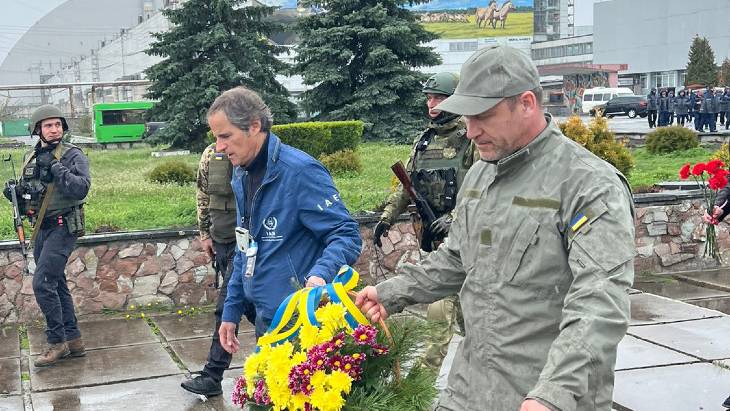It is the IAEA’s first full assistance mission, comprising safety, security and safeguards experts, to the country since the military conflict began. Chernobyl was taken over by Russian forces on 24 February and they remained in control of it until withdrawing from the area at the end of March.
Speaking on Tuesday evening, Grossi told reporters: "The mission here is very simple. There's a lot of work to be done after the occupation of this plant. We have been working with the Ukrainian regulator. We have to assess the situation. We have to do some repair work so we can restore the connectivity that we have with Vienna so we can provide good information to the Ukrainian people, and to the rest of the world, and we have to plan ahead.
"There are lots of activities and we are here. The main plan today is to deliver equipment. We have lots of equipment - dosimeters, radiation monitoring equipment, and other things - that we are bringing here. I'm here with some colleagues, nuclear safety experts from the IAEA, who have been working with the Ukrainian safety experts.
"We are going to compare our figures, we are going to be doing some monitoring in the area. Not only here, but in the exclusion zone as well, the assistance is going to continue. This is just the first batch of equipment ... we are coordinating of course, with the Ukrainian authorities. So as you can see, it's not only a symbolic visit, it's a visit where we are working."
Grossi added that he was "honoured to meet" the staff at the plant and "personally thank them for their resilience and courage during such extremely difficult times. They have my and the IAEA's full respect and admiration: they are heroes."
The anniversary of the 1986 accident at Chernobyl was marked by those at the site, with wreaths of flowers laid in remembrance, including by the IAEA mission. Grossi said: "Today marks 36 years since the Chernobyl nuclear power plant accident, the most severe in the history of nuclear power. I'm here to pay respect to the victims of the nuclear accident and to all those who work tirelessly to rebuild and protect this place."
The CEO of Ukraine's nuclear energy company Energoatom, Petro Kotin, said that despite the lessons from Chernobyl there was now renewed dangers from the occupation by Russian forces of the Zaporozhe nuclear power plant, where parts of the site were shelled and which, Kotin said, has had cruise missiles flying over it.
Ukraine said that of the 15 nuclear reactors in the country, seven are currently connected to grid, with the other eight reactors offline for regular maintenance or held in reserve.
The IAEA reported that safety systems remained operational at the country's four nuclear power plants although it was still not receiving remote data transmission from its monitoring systems installed at Chernobyl.















